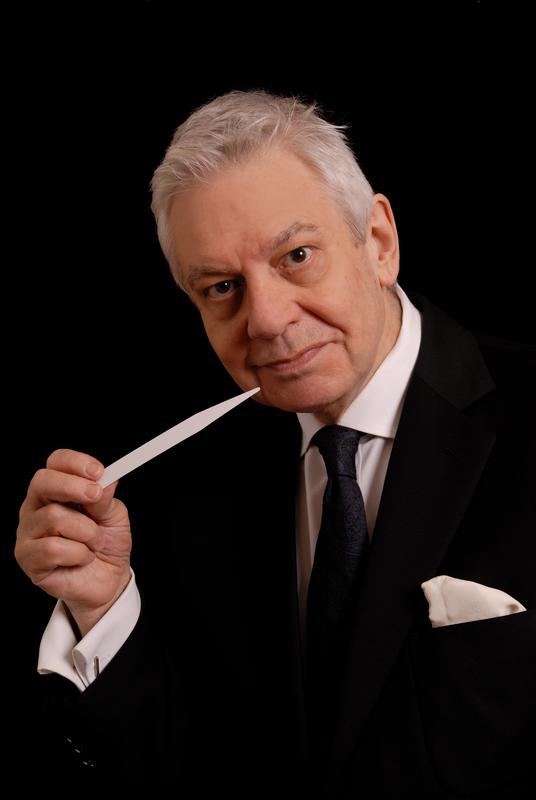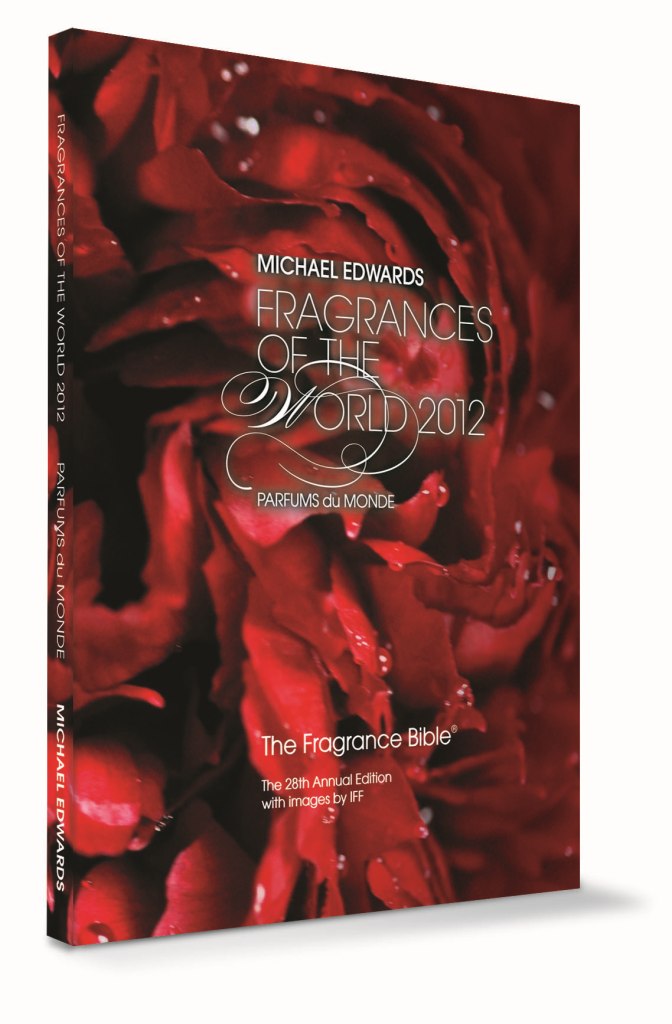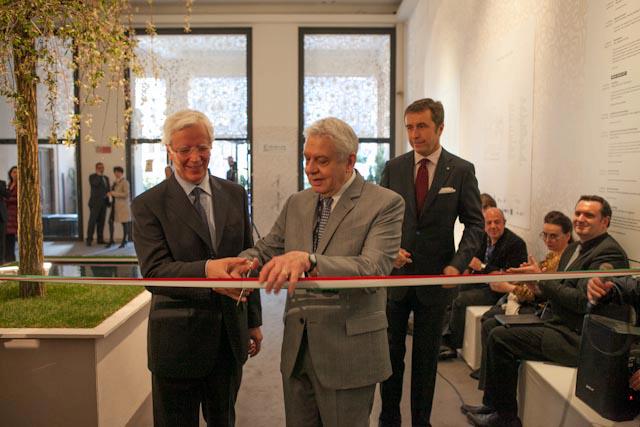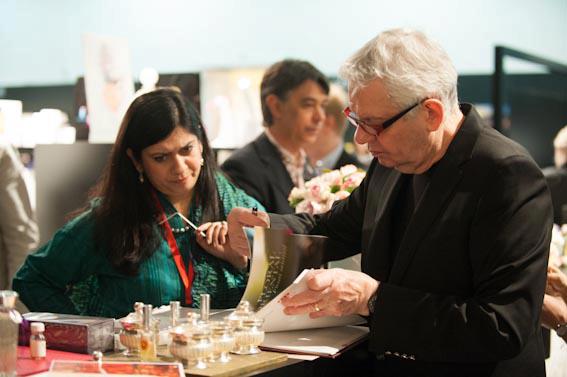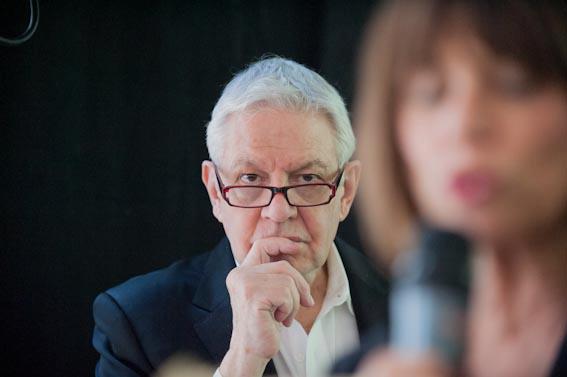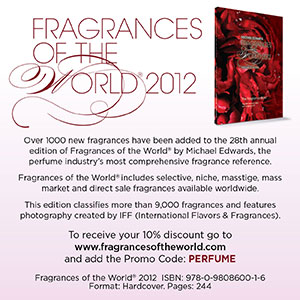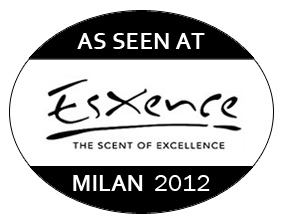June 6, 2012
An Exclusive Interview with Michael Edwards
Expert and Author, Fragrances of the World
by Mark David Boberick
Managing Editor
with Raphaella Barkley
Editor-In-Chief
I first met Michael Edwards in New York City in December of 2008 and sat down with him immediately following an impressive 2-hour master class that he had given which offered an incredible overview on his body of work. In that discussion, which was the first time in nearly ten years that Edwards had granted an interview, we talked about the foundations of his research and his entry into the fragrance industry.
When Michael Edwards speaks, you can become rather caught off guard by his eloquent brilliance and completely lose your train of thought after he says something utterly profound. (And I did, several times.) When I am interviewing someone, I often spend an entire conversation waiting for the profound statements, and sometimes they never come. But, Michael Edwards, on the other hand, never disappoints me – he is a walking encyclopedia of perfume history and knowledge. Chatting with Michael Edwards about perfume is akin to discussing King Tut with Egyptologist Zahi Hawass - there is simply no one better.
Dubbed “the perfume experts’ expert,” Edwards has made many important contributions to the fragrance industry, from his guide, Fragrances of the World, referred to as “the bible” of the industry and now in its 28th edition, to his FiFi-Award winning online database. Edward’s 1998 Perfume Legends was the first book to take us behind-the-scenes of the fragrance industry, offering rare interviews with some of the most legendary perfumers discussing the most iconic French fragrances.
As the guest of honor at Esxence in Milan, Edwards cut the ribbon to officially open the 4-day event, and offered his expertise at 2 different workshops. In the midst of it all, Raphaella and I sat down with the tireless Michael Edwards to pick up where we left off in 2008.
March 31, 2012
Windsor Hotel, Milan
Mark David: Michael, we are at Esxence in Milan, Italy - what seems to be “the capital of niche perfumery” for the past few days. Why is Milan so fitting to host an event that celebrates niche perfume?
Michael Edwards: Well, Milan is the financial center of Italy, and it’s the fashion center of Italy, so for a sense of “happening,” Milan couldn’t be better. But more than that –niche perfumery was born in France (think of Jean Francois LaPorte’s L’Artisan Parfumeur launched in 1978, or Annick Goutal in 1980, Serge Lutens Palais Royal Shiseido in 1992, etc.) and it grew up in America. If you’ll remember in the 1990s, many of the great brands [when Michael says “great brands,” he is referring to large corporate fragrance companies such as Dior and Estee Lauder, among dozens of others.] were diverted and you could get their perfumes in the most unusual places and markets. Department stores desperately needed brands to substitute and the niche brands were there, so they put all of their muscle and weight behind the niche brands. But if niche perfumes were born in France and grew up in America, for me they have come of age in Italy. There is no other country where you can find so many stores who just specialize in niche. In London, there are perhaps three and in the whole of Great Britain there are five. In Italy we estimate there are 85-95 retailers that specialize just in niche perfumes and another 150 that have a very significant investment – fifty percent plus. So, that’s why.
MD: Over the past few days as you were walking around the event, have you noticed that the quality of the fragrances being offered by the many exhibitors has been of a consistent high-quality?
ME: Oh goodness, no. No. In fairness, you’re not talking about a baby market. If you agree that the starting point for this market was L’Artisan Parfumeur in 1978, then you’re talking about a market that is now nearly forty years old. But, this is the flavor of the industry, so inevitably you’re going to get every Tom, Dick, and Jane trying their chance on this. But, we also have some lovely people trying their chance on it and amongst that, you’ve got some diamonds. But, it’s inevitable that you’ll have this. In the US, I go into department stores or perfume boutiques that carry niche brands in Los Angeles or New York and I look at some of the niche brands made by people I’ve never heard of – people who say they’re perfumers but I’m not sure that they really are perfumers – and often times the quality is just not there. They just don’t always smell good. But again, this is inevitable and I’m sure that if you go to the collections of some of the major designer fashion houses, you’re going to find this, as well. You’re going to see some lousy clothes and some fantastic clothes – it’s the same with the fragrance industry.
MD: In the lecture you gave only days ago at Esxence on the history of Eau de Cologne, you mentioned that Tom Ford Private Blend really started out as a niche brand, but has now evolved - downgraded, if you will, to be classified as a luxury brand.
ME: Absolutely, and this will happen again. To me, one of the fascinating things about niche perfumery is that when I first started classifying fragrances, I would see the great brands at least twice each year, and I would go through Fragrances of the World with them and they were very interested in what was happening with niche. But one could sense that they really didn’t take it too seriously. At that time, it was just tiny niche brands that hardly anyone knew about – brands that hardly had any budget. But the great brands didn’t count on the internet or the impact of the perfumistas. I once made a presentation to one great brand and I had to say, ‘I hate to tell you, but you’re no longer the movers and the shakers – you’re no longer the ones calling the shots. There is an audience out there that is being very critical, they are very knowledgeable, they truly love perfume and they are really looking for things that are interesting. They are the ones that are now calling the shots.” And you could really sense that the great brands didn’t quite know how to handle this. They had become so used to extensive testing, going through corporate ladders. There was no way – no procedure to “loosen the buttons,” if you will.
One of the most fascinating things is to see how the great brands have actually loosened their buttons. Shiseido, for instance with Palais Royal, is often one of the companies that is way ahead of the game. But just imagine what it must have taken for a huge company like Shiseido to say to Serge Lutens, “Here’s some money – do what you want,” and not expect a return for probably at least ten or fifteen years. But that’s just what they did, which is marvelous. The only other company I know that would do that would be Estee Lauder. Think of Clinique – how many years was it before it turned a profit? They’ve always given it time. Not many companies do that. But we started noticing that they were changing and suddenly you start getting lines like Tom Ford Private Blend. As I understand it, Tom Ford is not easy. He is very opinionated and has a great sense of taste and judgment – but he clicked with Lauder’s creative director Karen Khoury who has worked with Estee Lauder and then Evelyn Lauder since 1983. The two of them have been marvelous with bringing the perfumers on board and coming up with some incredibly innovative stuff – not commercial at all. There is no testing on Tom Ford Private Blend fragrances, no focus groups.
We also have Jean Claude Ellena at Hermes with the Hermessences. There is no brief, no testing – Jean Claude is free to create whatever he wants. Likewise for Mathilde Laurent with Cartier’s Les Heures de Parfums. And Francois Demachy with Dior’s La Collection Privee – Demachy calls it, “My concept car.” Marketing doesn’t tell him what to do – there is the concept of the range, but that’s all. When he’s ready to come up with something new, then he does.
So when you asked me earlier about quality, I think often people at shows such as this one in Milan are overlooking what is also happening in the Prestige market, and how this is another initiative that’s starting to come in. Their key competition, in fact, IS Hermessence. It IS Dior’s Private Collection. It IS Chanel’s Les Exclusifs – you cannot ignore that just because they come from big companies.
MD: So then what constitutes a niche fragrance, now?
ME: Well, this is a fascinating question. Indeed, what does constitute niche? Mandy Aftel, for example, believes it is little independent “indie” brands. But how many little indies are there and where do we draw the line? L’Artisan Parfumeur is owned by a private equity company. Annick Goutal was privately owned up until very recently. You could go on and on – but the rules we had before no longer apply. We cannot simply say that because Chanel owns Les Exclusifs, then Les Exclusifs are not part of the niche market – they certainly are.
MD: Or the philosophy that you have to stay small to stay niche…
ME: Which they do. Les Exclusifs are only available in Chanel boutiques – nowhere else.
MD: In the past few years, how many niche brands have you seen disappear?
ME: Not many, in fact. Many of them are holding on and I feel for them. But when you think of it, most of the brands that were there ten years ago are still holding on – it’s a tribute, really. The tiny little brands that you find in the states in particular – they come and go. The mom and pop businesses that say, “I’m a perfumer” – they do come and go and I have noticed that.
MD: Do you find that the regulations that IFRA have imposed have a stronger impact on the niche market than the commercial market? If, for instance, all of a sudden a strong regulation came down on Iso e Super that seriously limited its usage in perfumery, you would probably have all of the great brands coming together and we would see that regulation evaporate.
ME: But when we talk IFRA, we’re mainly talking about naturals. And I sense that deep down, you are equating niche with their more abundant usage of naturals. Why? Do you have to say that to be a great piece of jewelry, you must use silver or gold? There are some marvelously innovative synthetic notes being released. If you look at Mark Buxton – I would wager that the majority of his work is synthetic because it is more creative – you can do so much more with it than you can with naturals. Do you need naturals? Sure you do, you can get a very fine quality when you use them. But the beauty of the niche brands is that for the prices they charge, they can afford the fine quality naturals as well as the synthetics. So, in many ways they have the best of both worlds. Geza Schoen is another perfumer - the work he has done for his own label, Escentric Molecules, is stellar; it is innovative perfumery with synthetic molecules at its very best.
MD: Do you think that is the future of perfumery?
ME: No, I think it’s just another part. It’s like a piano – we now have notes there that we didn’t have before and we can “play” them. You probably sense that I feel very strongly about synthetics because for me, the whole magic of 20th and 21st Century Perfumery is quite literally the combination of great naturals with innovative synthetics. There isn’t a single fragrance of distinction in the last 100 years that doesn’t rely on synthetic molecules at the base. Even JOY by Jean Patou. You can’t just put a bunch of roses together and expect it to stay. The synthetics add a quality of originality to it.
This is not a discussion of naturals being good and synthetics being bad – we are talking about the creative use of a “new” note, whatever it happens to be. Do we need naturals? Yes, because we still can’t entirely replicate nature – nature has given us a fine natural symphony of individual chemicals.
MD: I think we can both agree that some of the regulations handed down by IFRA make absolutely no sense. But the heart and soul of what you do Michael is classification. Due to these regulations causing many classic fragrances to be reformulated so significantly that they are shadows of their former selves, has a reformulation ever caused a fragrance’s classification to change?
ME: Yes. Houbigant’s Fougere Royal. It was the iconic fougere. But the new one? No. It’s a chypre. Some have said that the original Fougere Royal was, in fact, a chypre. Well, not the one that I’VE smelled. So, in the guide, Fougere Royale is listed twice – one listing has 1882 after it and the other has 2010. I don’t understand why they turned that into a chypre. I’ve spoken to Rodrigo Flores-Roux, the perfumer, and I’ve spoken to Roja Dove who was greatly involved in reviving the iconic fragrance – it was the original that gave it’s name to the fougere family so for me, its fairly sad that the 2010 version now belongs to a different family.
Listen, let’s come down to reality. Jacque Polge’s job with Chanel No. 5 is not to make the same goo week in and week out. Because the truth of the matter is, the flowers you pick this month are going to be different than the flowers you pick next month – you can’t change that. So part of the perfumer’s job has always been to blend the old with the new to make sure there is a consistent standard. It’s no different than the Whiskey blenders that have to do the same thing. So when you talk about the reformulation of perfumes – obviously there are some that have been extremely difficult to reorchestrate. Look at poor Mitsouko, for instance. But I think Guerlain has done an amazing job with reformulating Mitsouko. Estee Lauder’s Knowing is another and I use it as an example because like Mitsouko, it uses one of the most restricted materials – oakmoss. Knowing was very rich in oakmoss but I personally can’t tell the difference between the old Knowing and the new Knowing. Nina Ricci’s L’Air du Temps is another great classic that inevitably was reformulated, but the one thing that they never did was cheapen the quality.
My thanks to Michael Edwards for once again granting us the rare
opportunity to interview him in Milan.
For more information, please visit Michael Edwards'
website, Fragrances of the World
Be sure to read PART 1 of my Interview from 2009.
MARK DAVID BOBERICK | Managing Editor
Michele Dell'Utri
Michele Dell'Utri
Michele Dell'Utri
Disclaimer: The views and opinions expressed herein are solely those of the author and/or guest contributors and do not necessarily state or reflect those of The Perfume Magazine LLC, Raphaella Brescia Barkley or Mark David Boberick.
All content included on this site, such as text, graphics, logos, icons, videos and images is the property of The Perfume Magazine, LLC. or its content suppliers and protected by United States and international copyright laws. The compilation of all content on this site is the exclusive property of The Perfume Magazine, LLC. and protected by U.S. and international copyright laws.
The Perfume Magazine.com is solely owned and operated by Raphaella Barkley Raphaella Barkley; Editor, Founder and Owner of The Perfume Magazine LLC.
The Perfume Magazine Forums, The Perfume Magazine.com, The Perfume Magazine FaceBook,The Perfume Magazine Twitter, and Sniffapalooza Magazine.com, as well as all The Perfume Magazine Social Media, is also solely owned and operated by Raphaella Barkley and The Perfume Magazine LLC.
The Perfume Magazine Banner was designed exclusively by GIRVIN and is the property of The Perfume Magazine, LLC.
All images appearing in the banner are registered trademarks of their respected company and are used with permission.
The logo and banner are property of The Perfume Magazine, LLC. and are protected by U.S.and international copyright laws.
© Copyright. 2012. All Rights Reserved. The Perfume Magazine LLC 2012
